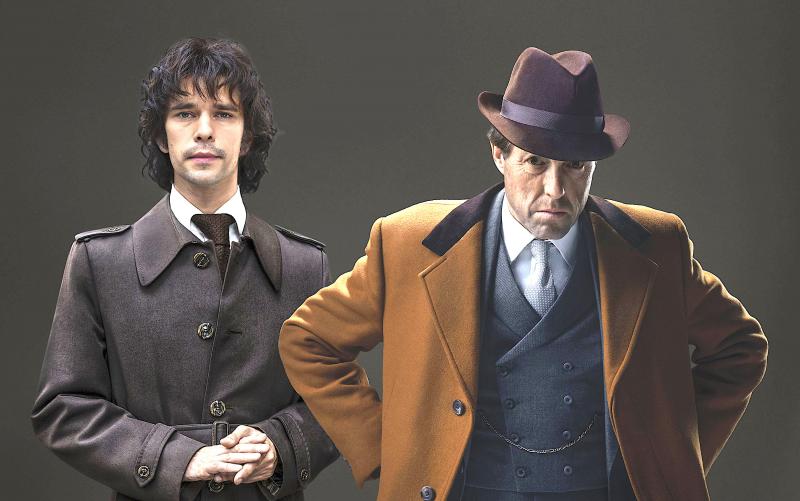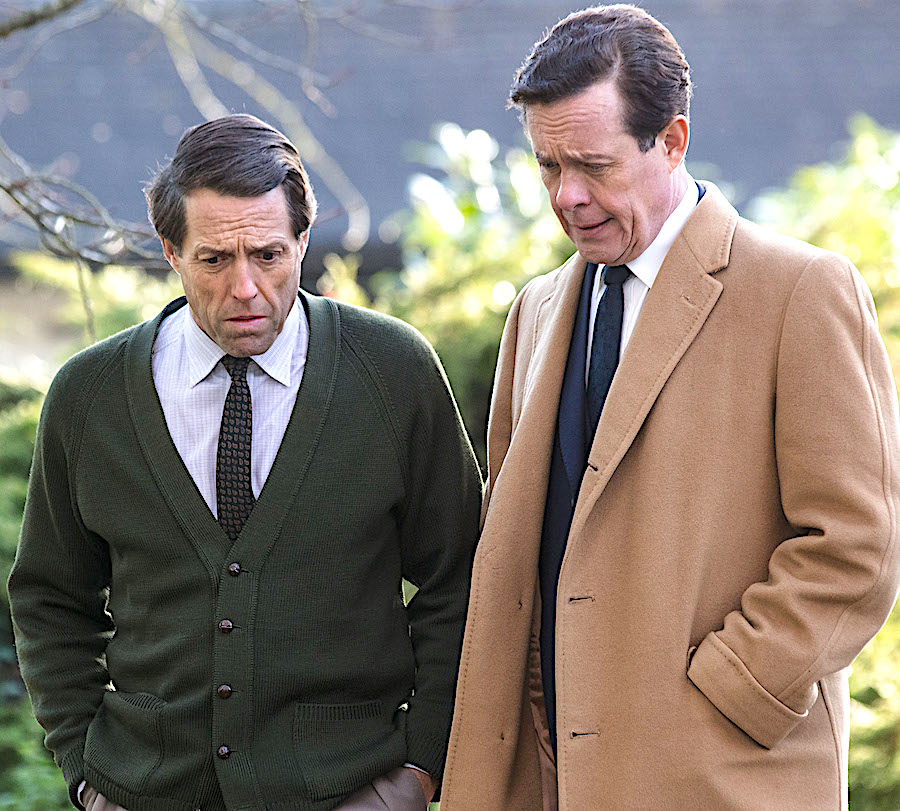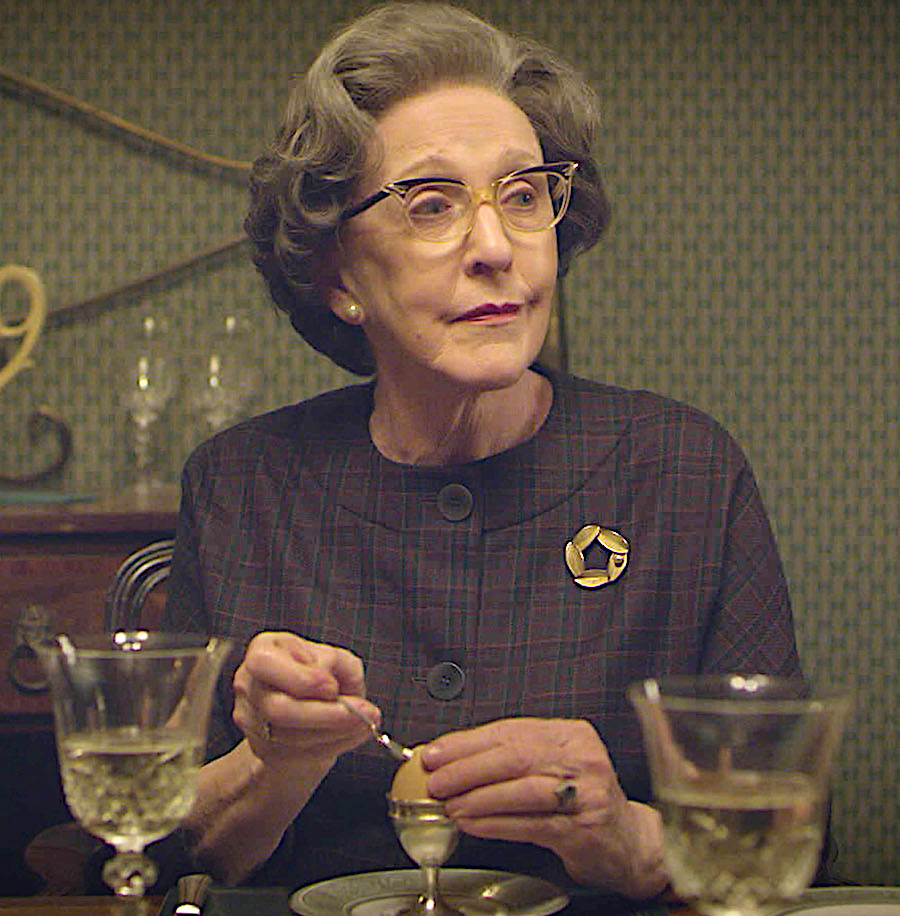A Very English Scandal, BBC One review - making a drama out of a crisis | reviews, news & interviews
A Very English Scandal, BBC One review - making a drama out of a crisis
A Very English Scandal, BBC One review - making a drama out of a crisis
Tragedy and farce in glittering recreation of the Jeremy Thorpe saga

There was a time when Hugh Grant was viewed as a thespian one-trick pony, a floppy-haired fop dithering in a state of perpetual romantic confusion. But things have changed. He was excellent in Florence Foster Jenkins, hilariously self-parodic in Paddington 2, and he’s brilliant in A Very English Scandal (BBC One) as smooth, treacherous Liberal leader Jeremy Thorpe.
Thorpe himself would doubtless have dreamed of pulling off a similar feat of reinvention, but for all his success as a revitalising force in the Liberal Party, his goose was cooked as early as 1961, when he met the then Norman Josiffe, later Norman Scott. He was working as a stable boy at the home of Thorpe’s wealthy friend, Norman Ven De Vater, and Thorpe’s attraction to him would eventually prove politically and personally fatal.
 With a screenplay by Russell T Davies (adapted from John Preston’s book) and helmed by Stephen Frears, A Very English Scandal is a fascinating, appalling and often scathingly funny journey through the putrescent innards of the British political establishment. The opening scene, where Thorpe and Liberal MP Peter Bessell (Alex Jennings, pictured right with Grant) conduct a coded discussion about their (then illegal) homosexuality over a most agreeable lunch, has been planted like a bomb which will continue to tick remorselessly beneath the unfolding action (“Peter, we are nothing but a pair of old queens,” Thorpe announces, as he raises a toast to “Her Majesty”.)
With a screenplay by Russell T Davies (adapted from John Preston’s book) and helmed by Stephen Frears, A Very English Scandal is a fascinating, appalling and often scathingly funny journey through the putrescent innards of the British political establishment. The opening scene, where Thorpe and Liberal MP Peter Bessell (Alex Jennings, pictured right with Grant) conduct a coded discussion about their (then illegal) homosexuality over a most agreeable lunch, has been planted like a bomb which will continue to tick remorselessly beneath the unfolding action (“Peter, we are nothing but a pair of old queens,” Thorpe announces, as he raises a toast to “Her Majesty”.)
Thorpe’s vanity and sense of insuperable entitlement ooze from Grant’s performance, as he seizes the Liberal leadership after Jo Grimond’s resignation in January 1967, then pursues a career characterised by his charismatic performances in the Commons as he pursues his “Liberal crusade” on the one hand, and his hazardous secret life as a promiscuous gay man on the other. Of course, we know the way it’s going to play out, but the nuance and subtlety with which the relationship with Scott is explored mean that the drama is continuously suspenseful.
 It wouldn’t, and couldn’t, have worked without Ben Whishaw’s magnetic portrayal of Scott, unwisely dismissed by Thorpe as a trivial irritation who could be easily bought or bullied off. He emerges here as a far more complex character, whose battle against mental health issues didn’t prevent him from displaying an uncanny gift for blackmail. Whishaw plays the often discordant notes of Scott’s personality with the touch of a master pianist, catching his pitiful loneliness and insecurity, then slipping imperceptibly into threats and coercion (he’s only too well aware of the explosive potential of the cache of Thorpe’s disastrously indiscreet letters which he has carefully husbanded).
It wouldn’t, and couldn’t, have worked without Ben Whishaw’s magnetic portrayal of Scott, unwisely dismissed by Thorpe as a trivial irritation who could be easily bought or bullied off. He emerges here as a far more complex character, whose battle against mental health issues didn’t prevent him from displaying an uncanny gift for blackmail. Whishaw plays the often discordant notes of Scott’s personality with the touch of a master pianist, catching his pitiful loneliness and insecurity, then slipping imperceptibly into threats and coercion (he’s only too well aware of the explosive potential of the cache of Thorpe’s disastrously indiscreet letters which he has carefully husbanded).
Frears has built any number of incidental delights into his story. The scene where Thorpe dazzles Scott by playing a violin sonata accompanied on piano by his mother Ursula (an unflinchingly flinty Patricia Hodge, pictured above) is magnificent in its incongruousness. Then Thorpe visits Scott’s bedroom, thoughtfully bringing his own jar of Vaseline, to seize his reward (“just hop onto all fours, old chap, that always works best”).
But Davies never quite lets us forget the tragic undertones of the piece. An interlude featuring Lord Arran (David Bamber) veers abruptly from mad eccentricity to real anguish as Arran reflects on his gay brother’s suicide. Thorpe also supports Leo Abse’s campaign to reform the repressive homosexuality laws, but harbours no illusions that this would protect him in the event of his secret life becoming public. If that happened, he tells Bessell, he’d shoot himself.
As episode one ends, the mood is already turning apocalyptic. “We kill him,” Thorpe says of Scott. “He will destroy me, the party and my marriage."
The future of Arts Journalism
You can stop theartsdesk.com closing!
We urgently need financing to survive. Our fundraising drive has thus far raised £49,000 but we need to reach £100,000 or we will be forced to close. Please contribute here: https://gofund.me/c3f6033d
And if you can forward this information to anyone who might assist, we’d be grateful.

Subscribe to theartsdesk.com
Thank you for continuing to read our work on theartsdesk.com. For unlimited access to every article in its entirety, including our archive of more than 15,000 pieces, we're asking for £5 per month or £40 per year. We feel it's a very good deal, and hope you do too.
To take a subscription now simply click here.
And if you're looking for that extra gift for a friend or family member, why not treat them to a theartsdesk.com gift subscription?
more TV
 Mr Scorsese, Apple TV review - perfectly pitched documentary series with fascinating insights
Rebecca Miller musters a stellar roster of articulate talking heads for this thorough portrait
Mr Scorsese, Apple TV review - perfectly pitched documentary series with fascinating insights
Rebecca Miller musters a stellar roster of articulate talking heads for this thorough portrait
 Down Cemetery Road, Apple TV review - wit, grit and a twisty plot, plus Emma Thompson on top form
Mick Herron's female private investigator gets a stellar adaptation
Down Cemetery Road, Apple TV review - wit, grit and a twisty plot, plus Emma Thompson on top form
Mick Herron's female private investigator gets a stellar adaptation
 theartsdesk Q&A: director Stefano Sollima on the relevance of true crime story 'The Monster of Florence'
The director of hit TV series 'Gomorrah' examines another dark dimension of Italian culture
theartsdesk Q&A: director Stefano Sollima on the relevance of true crime story 'The Monster of Florence'
The director of hit TV series 'Gomorrah' examines another dark dimension of Italian culture
 The Monster of Florence, Netflix review - dramatisation of notorious Italian serial killer mystery
Director Stefano Sollima's four-parter makes gruelling viewing
The Monster of Florence, Netflix review - dramatisation of notorious Italian serial killer mystery
Director Stefano Sollima's four-parter makes gruelling viewing
 The Diplomat, Season 3, Netflix review - Ambassador Kate Wyler becomes America's Second Lady
Soapy transatlantic political drama keeps the Special Relationship alive
The Diplomat, Season 3, Netflix review - Ambassador Kate Wyler becomes America's Second Lady
Soapy transatlantic political drama keeps the Special Relationship alive
 The Perfect Neighbor, Netflix review - Florida found-footage documentary is a harrowing watch
Sundance winner chronicles a death that should have been prevented
The Perfect Neighbor, Netflix review - Florida found-footage documentary is a harrowing watch
Sundance winner chronicles a death that should have been prevented
 Murder Before Evensong, Acorn TV review - death comes to the picturesque village of Champton
The Rev Richard Coles's sleuthing cleric hits the screen
Murder Before Evensong, Acorn TV review - death comes to the picturesque village of Champton
The Rev Richard Coles's sleuthing cleric hits the screen
 Black Rabbit, Netflix review - grime and punishment in New York City
Jude Law and Jason Bateman tread the thin line between love and hate
Black Rabbit, Netflix review - grime and punishment in New York City
Jude Law and Jason Bateman tread the thin line between love and hate
 The Hack, ITV review - plodding anatomy of twin UK scandals
Jack Thorne's skill can't disguise the bagginess of his double-headed material
The Hack, ITV review - plodding anatomy of twin UK scandals
Jack Thorne's skill can't disguise the bagginess of his double-headed material
 Slow Horses, Series 5, Apple TV+ review - terror, trauma and impeccable comic timing
Jackson Lamb's band of MI5 misfits continues to fascinate and amuse
Slow Horses, Series 5, Apple TV+ review - terror, trauma and impeccable comic timing
Jackson Lamb's band of MI5 misfits continues to fascinate and amuse
 Coldwater, ITV1 review - horror and black comedy in the Highlands
Superb cast lights up David Ireland's cunning thriller
Coldwater, ITV1 review - horror and black comedy in the Highlands
Superb cast lights up David Ireland's cunning thriller
 Blu-ray: The Sweeney - Series One
Influential and entertaining 1970s police drama, handsomely restored
Blu-ray: The Sweeney - Series One
Influential and entertaining 1970s police drama, handsomely restored

Add comment